Janet Bravo
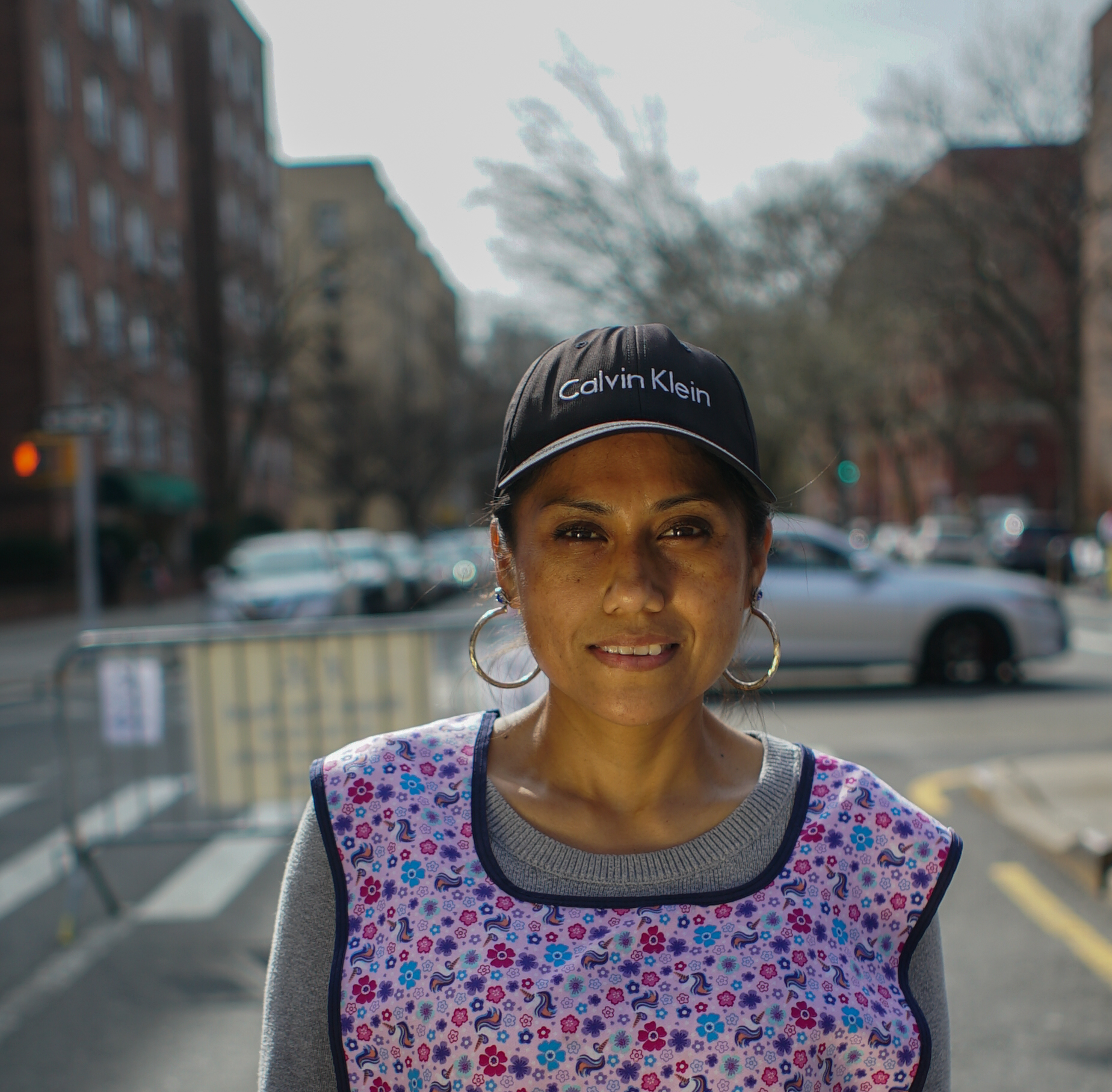
On a brisk afternoon in November 2020, Janet Bravo stood behind a folding table loaded with her homemade arroz con leche, chicharrones, and flautas, Mexican sweet bread baked by her cousin, and soft drinks and candy.
Janet had risen at 6:00 a.m. to start preparing food to sell. Using recipes she learned from her mother, she began the day by cooking chicken for the flautas, then preparing beans and homemade salsa verde. She fried wheel-shaped wheat crisps for chicharrones, a popular street snack, while checking on her four kids, helping the two youngest log into their remote classes. She cooked a cup of rice for the arroz con leche, added cinnamon, sugar and a gallon of milk, then poured the concoction into a two-gallon thermos, one of the few purchases she made to prepare for her new vending career on 34th Avenue.
She sets up her table on the median directly outside her apartment. On days when customers finish the arroz con leche, she crosses the street, steps back inside, and whips up another batch.
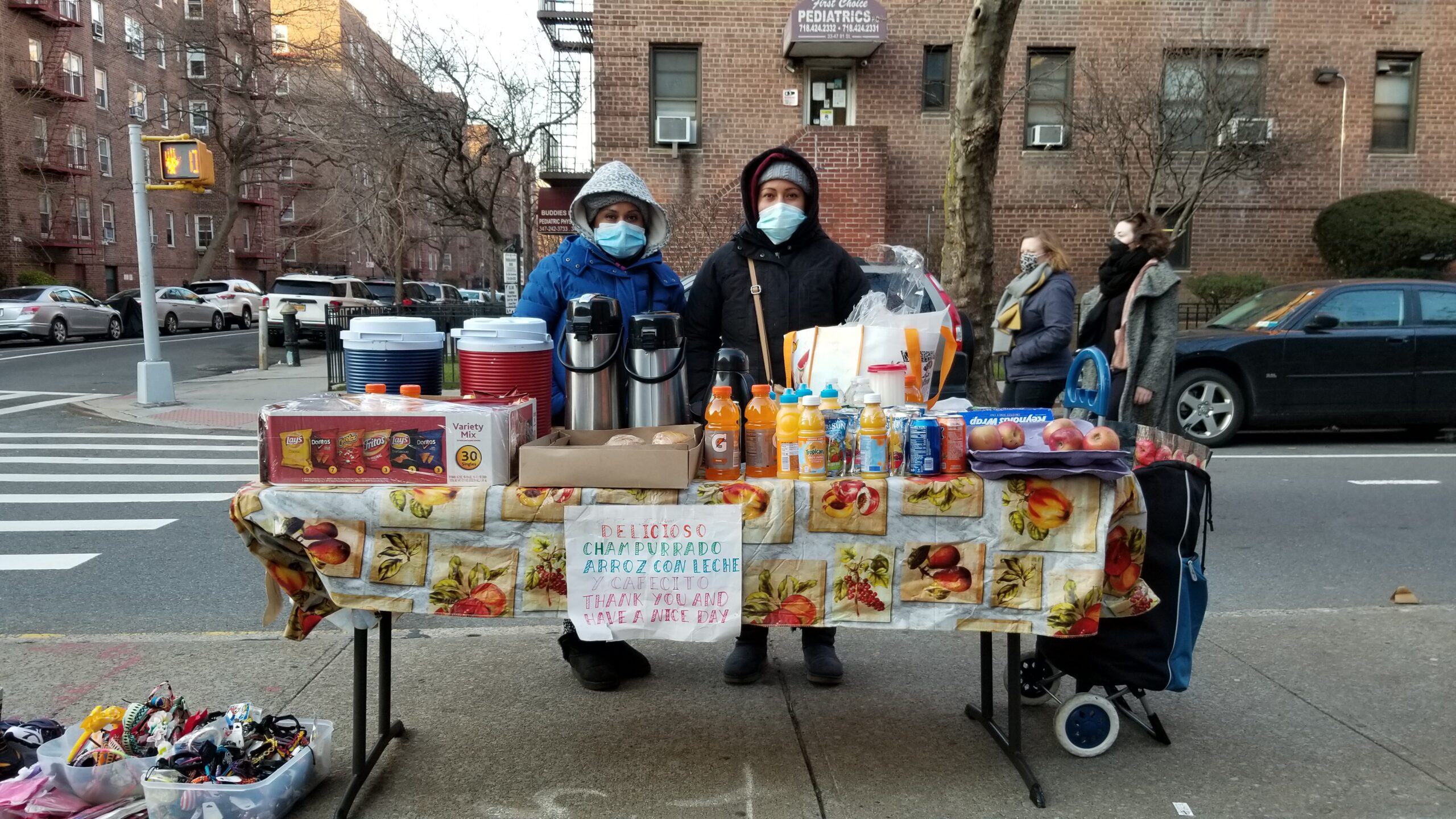
All the preparation can feel overwhelming when Janet is in her kitchen, but when she’s out on 34th Avenue, she can relax. Throughout the day, people stop by and talk to her. Her friend Hilaria, who lives ten blocks away, often sets up next to her to sell homemade tamales. Janet has always been friendly, but has gotten to know her neighbors better since the pandemic.
In the interview excerpt below, Janet (speaking Spanish) and her eldest daughter Alysia (speaking English) talk about how the Open Street brought neighbors closer together:
Click to Read Transcript
Bridget: What's the atmosphere like on the Open Street?
Janet: Se siente bien bonito porque uno mira gente. Ya uno sale diario no mira la misma gente. Te saluda, como ya uno va conociendo más personas la rutina, que vienen, que pasan. Es bonito.
Alysia: She likes the atmosphere because it's really nice. Everyone now is getting to know each other better and they're more familiar with each other. They'll say hi to each other more. Everyone's a lot closer. Before they didn't even know who the neighbors were, and now they all know each other.
Bridget: So you see a lot of friends on the Open Street.
Janet: Sí, yo conozco muchas personas, muchos amigos, ya ahora tenemos más conocidos. Y mis niñas también. Están esperando que sea verano para que vuelvan a ver sus amiguitos que hicieron el año pasado porque hicieron muchos amiguitos aquí afuera.
Alysia: She said that she has a lot of friends now, and also my little sisters, they're very excited for the summer to come, the warmer weather, because they're excited to see the friends they made last summer.
Janet: Y siempre encuentras alguien que se queda platicando conmigo allí.
Alysia: And she always find someone that just stays there and talks to her and have a conversation.
Janet: Porque hay mucha gente que pasan y dicen que están estresados.
Alysia: There's a lot of people that walk by—
Janet: Tienen pánico.
Alysia: —and they will talk to her, telling her that they're stressed out from the pandemic, and they are scared, or they're panicking. So a lot of people find comfort in talking to others on the Open Streets.
Janet: Puedes hablar con personas que ni conoces, pero ellos, te quieren platicar. Te escuchan.
Alysia: She talks to a lot of people that she doesn't even know, but everyone's listening to each other.
Bridget: And that's different from before?
Janet: Sí, es diferente de antes, porque antes, la gente no se paraba. No se detenían, ni si quiera te quieren ver. Pasaba rápido.
Alysia: Yeah, it's very different because she said people would just walk by you and not even say hi. They would just walk by you and be like, whatever. Now she just thinks that it's easier for people to actually talk to each other.
This November afternoon, neighbors called out “Hola!” as they walked by, and on the median beside her, Janet’s seven-year-old splayed out with two other little girls, playing with dolls. “For kids, the Open Street is like a park,” Janet said. “My little one, she loves it.”
Janet is too busy vending to attend the free dance classes that her friend Oscar organizes on 34th Avenue, but she sometimes goes for morning walks in the car-free streets. She used to be overweight, and her doctor prescribed exercise. “They say to go to the gym, but it’s dangerous inside. So here I exercise.” She marches in place behind her table and does calf raises on the curb of the median. She has a folding chair, but never seems to sit.
Her building’s superintendent came over and ordered flautas, then sat in her chair and chatted while Janet took two chicken-filled corn tortillas out of a Tupperware container and carefully topped them with beans, shredded lettuce, salsa verde, sour cream, and a sprinkle of cotija cheese. After each transaction, Janet picks up the bottle of hand sanitizer that sits on her table and squirts a generous dollop into her hands. Her super continued regaling her with a story while he sat and ate beside her.
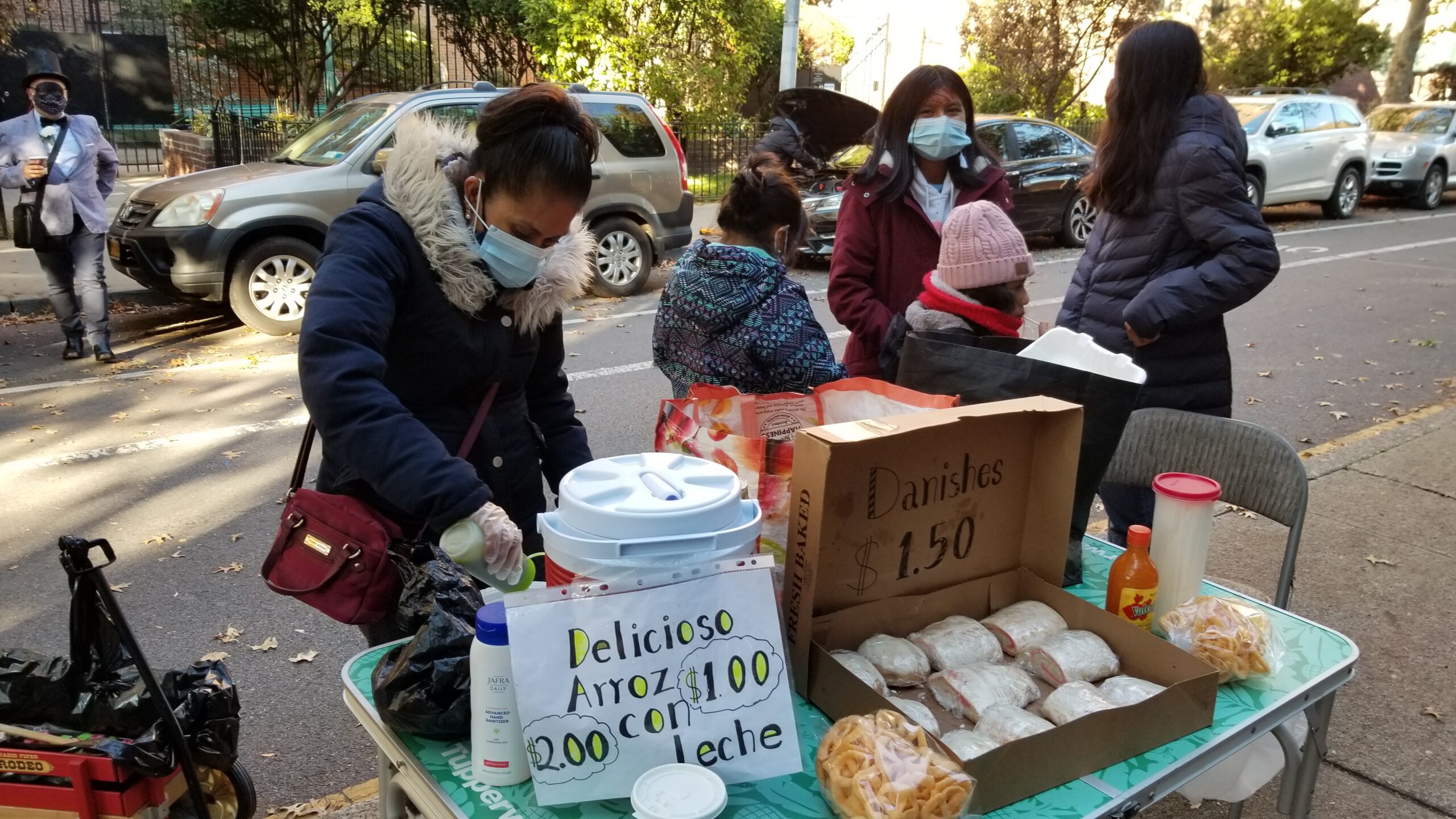
For the past eight years, Janet and her husband, Miguel, had worked at a pushcart in Harlem, selling coffee, tea, donuts and bagels. They had to stop working on March 22nd, 2020, when Governor Cuomo issued the “PAUSE” executive order mandating that non-essential businesses close. Fear gripped the city; suddenly, there were no customers on the usually bustling intersection of 125th Street and Lexington Avenue where they set up their food cart, and eventually even the garage where they stored their cart closed.
The next four months, Janet stayed inside with her four children and husband. Afraid of catching coronavirus, they only left the house for the most essential purposes, like trips to the grocery store or the pharmacy. “Every day was scary,” Janet said. “Oh my God, the stress. We had no money, and the rent doesn't stop.” With no income, soon they found themselves unable to pay rent. At the same time, prices for food they were used to buying cheaply - like beef, cheese, flour, and tortillas - shot up.
In this excerpt, Janet and Alysia recall how they lived off of eggs:
Click to Read Transcript
Janet: La comida se subió mucho.
Alysia: Food that we were used to buying at an affordable price, it was no longer affordable. So it got to the point where the food was just—we were not eating beef, we were not eating cheese, we would just eat eggs.
Janet: Porque decía, es mejor—que vamos a morir de colesterol, pero no vamos a morir de hambre. Hay huevitos.
Alysia: She said, it's better to just not starve, and at least have something to eat. And we were trying to save all the money we had. It was like a sacrifice that my mom had to make, we all had to make.
Bridget: How would you prepare eggs?
Janet: Nosotros preparamos con huevo, jalapeño, y tomates, cebolla. Nosotros le llamamos huevo a la mexicano.
Alysia: So there's one style, which is very basic Mexican-style eggs, which is with jalapeno, onion, tomato. That's one way, with beans on the side.
Janet: Y otro, para que las niñas comieran, huevos con ejotes.
Alysia: Another style, for the kids, was eggs with string beans.
Janet: Y huevos con papa, huevos con raja. Pero siempre eran huevos, huevos, huevos!
Alysia: The other popular style was eggs with potato and jalapeno slices and onion.
Janet: Huevos hervidos con arroz.
Alysia: Or hard-boiled eggs with rice.
Janet: Pero siempre, huevos, huevos, huevos!
Alysia: But every day it was eggs.
Janet: Entonces, a Alysia nunca se le va a olvidar porque ella siempre decía, “Oh my God! En esta casa, no vamos a morir de covid, uno va a morir de colesterol.”
Alysia: She said yeah, she's never gonna forget that I said that, I, personally, it was very stressful for me because I didn't want to eat eggs anymore. So it affected me badly because I'm like, you know, in this household, we're not going to die from COVID. We're actually going to die from cholesterol. So, but it was dramatic, but it was just so stressful at that point.
Janet: Pero, no importa porque los huevos, las niñas comían los huevos, huevos. Así no más; huevo scramble, así revuelto, y así con tortillas y enredados taquitos comimos con huevo ya.
Alysia: They'll even make egg tacos. So, scrambled eggs with tacos, and they'll roll up the tortilla.
Janet: Huevos con brócoli, huevos con lo que había, pero huevo allí, para que no tuviéramos hambre.
Alysia: Yeah, she'll try to change it up, so we weren't always hungry.
Bridget: You're really creative with coming up with different ways to make eggs.
Janet: Pero sí comíamos huevos, pero diferente huevos. Pero siempre el huevo.
Eventually, Janet’s husband Miguel returned to work in Harlem two days a week, and she stayed home to look after the kids and help them with remote schooling. In Harlem, the thinned out crowds rushed past his cart; people weren’t stopping to buy coffee and donuts anymore. Then they got a letter from their landlord saying they were going to be evicted. They had to make money somehow.
Janet’s bedroom overlooks 34th Avenue. She saw people exercising on the Open Street, and knew they would want drinks like water and Gatorade. She wanted to try street vending on the avenue, but while she had her permit and food handlers card, she didn’t know if setting up there would mean risking high fines and police harassment. “That’s my fear. Before I saw police take away food from vendors and put it in the garbage, and take away their license.”
Then in June, following mass protests against police violence and pressure to cut NYPD funding, Mayor de Blasio announced that the police would no longer enforce street vendor regulations. As soon as Janet heard the news on the radio, she asked Miguel to stock up on bottles of Gatorade and water from Costco, repurposed the shopping cart she used for laundry to hold a cooler, and set up on 34th, selling drinks for a dollar.
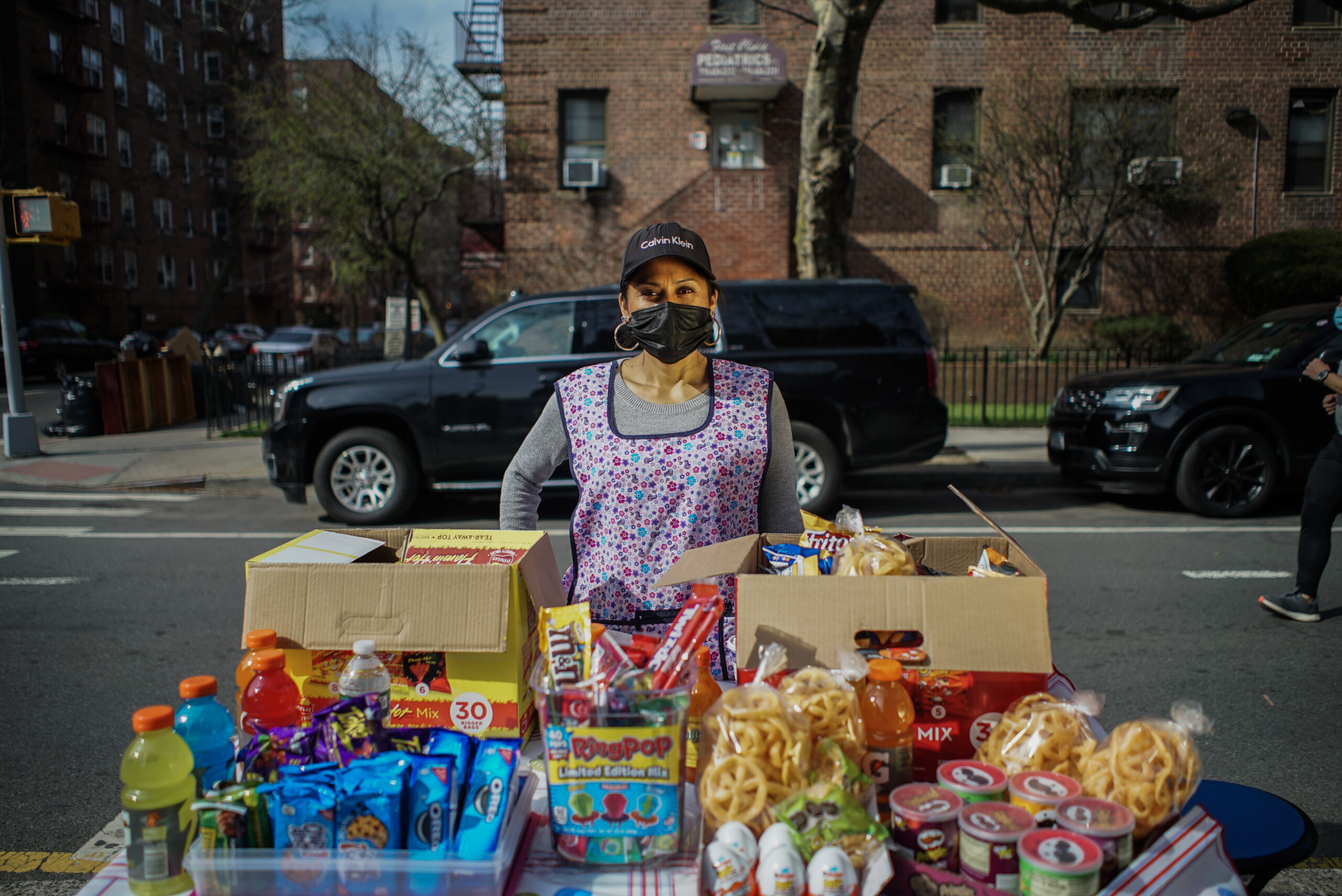
The first month she only sold bottled beverages. “Then people said, ‘Why don't you sell food? I’m coming from work, I’m hungry!’” She decided to make flautas because they’re easy to eat on the go. She would sell an average of 25 flautas a day, making anywhere from $30 on a bad day to $60 on a good day. In October, when it started getting colder, her regular customers suggested, "Why don't you sell something that will keep us warm?" She expanded her offerings to include coffee, arroz con leche, and champurrado, a hot chocolate drink thickened with masa corn flour.
She had to stop selling her flautas in the winter, because the freshly assembled ingredients got cold too quickly, but those in the know still pre-order them from her directly.
Despite the stress and fear of the pandemic, this time brought Janet's family closer. Everyone used to be busy with their routines of going to work and school, but now that they were together, they began communicating more. “Tanto siempre estamos juntos. Nunca estábamos como ahora. Este pandemia nos ha ensenado a ser mas unidos," Janet said. We are together so much. We've never been like we are now. This pandemic has taught us to be more united. "Now I know family is most important to me. It's everything for your life."
In the spring of 2021, Miguel started bringing their food cart to 34th Avenue, and they began working together again in their own neighborhood, close to their children.
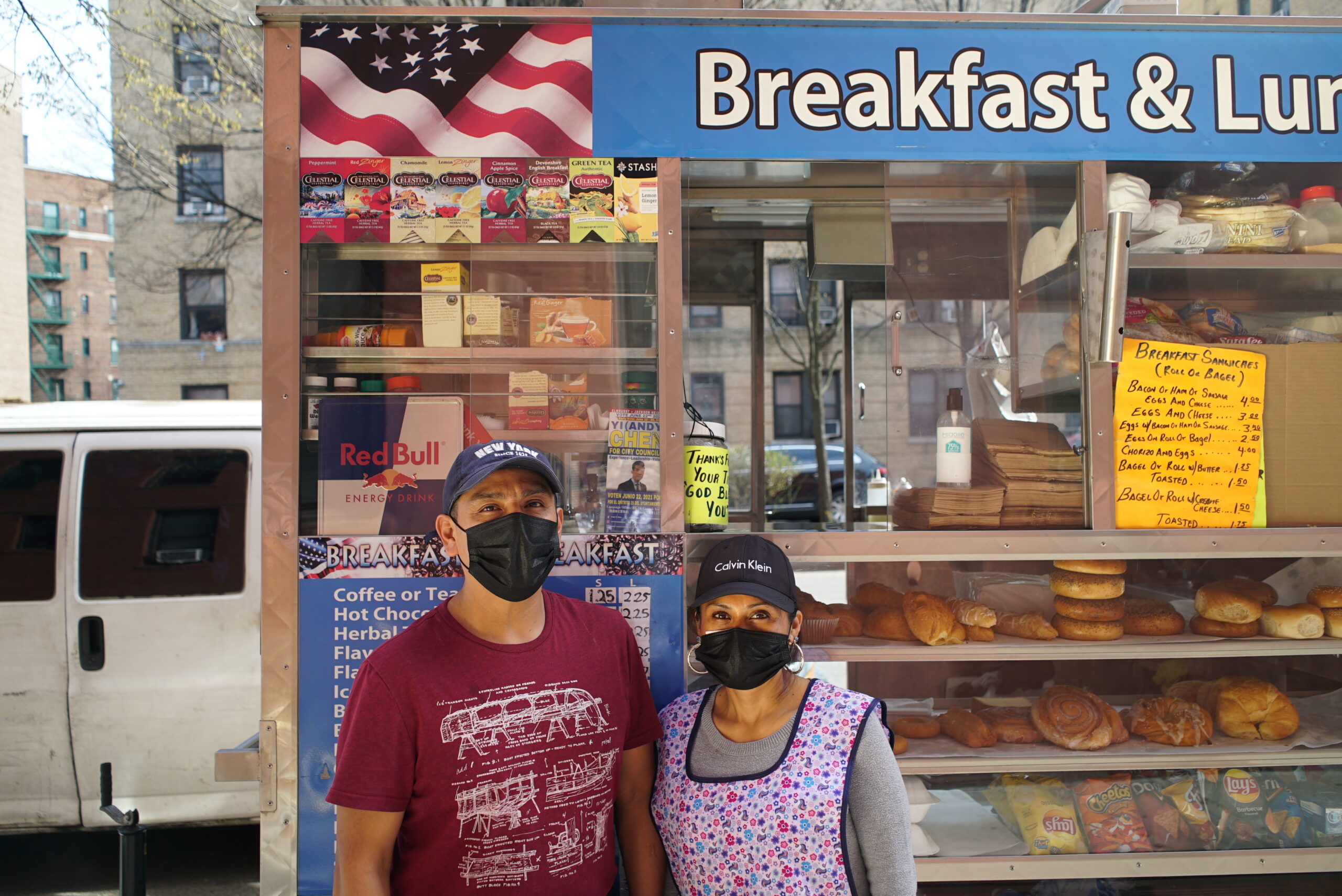
Janet and Miguel are working and saving as much as they can. They hope to have a brick and mortar store and own their own home someday.
Throughout the winter, when Janet stationed herself on 34th Avenue almost every day from 8:00 a.m. until 4:00 p.m., she would wear three layers of pants and three sweaters under her big winter coat, along with super thick socks, and hand warmers inside her gloves. Her youngest daughters would ask her, "Why do you have to go outside? It's so cold." The pandemic showed her the importance of saving money, and she wants to impart this to her children. She tells them, "Aprendan y prepárense para que ustedes tengan un futuro mejor, y no tengan que sufrir lo que nosotros estamos sufriendo." Learn and prepare yourselves so that you can have a better future, and not have to suffer the way we've suffered.
She is optimistic that her children won't struggle as she has.
Janet earned more at her old job in Manhattan, where she had a steady stream of customers every day. Business on 34th Avenue is less reliable. “Here if you don’t sell, you have nothing,” she said. Nevertheless, she prefers the life of an entrepreneur. “Here’s better, because it’s mine. It’s not for somebody else. It’s something for us, our family. People like my arroz con leche, and that makes me happy.”
Published July 2021